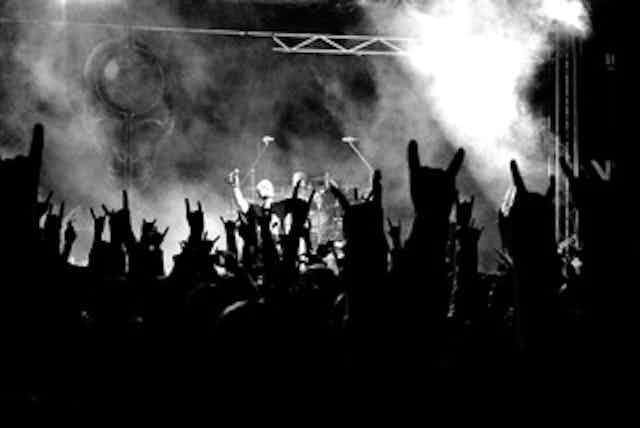Death metal is a baffling genre to many people. The music is aggressive, the lyrics are often violent and misogynistic, and it has been blamed for inciting violent crimes such as rape and murder.
Cannibal Corpse, one of the most successful death metal bands, has sold over 2 million units worldwide and sings about topics such as murder, rape, torture, infanticide, decapitation and necrophilia. The sale of Cannibal Corpse recordings was even banned in Australia from 1996-2006.
Why are millions of music lovers around the world so powerfully attracted to aggressive music? Should we be concerned? There is evidence that exposure to music with violent themes can leave people feeling hostile, but most of this research has not considered the experiences and motivations of its fans.
Our recent research, soon to be published in the American Psychological Association’s journal, Psychology of Popular Media Culture, addressed this gap by comparing the experiences and motivations of fans and non-fans of death metal music.
We asked 48 fans and 97 non-fans to listen to music from bands such as Cannibal Corpse. They then rated their emotional experiences, using a range of psychological scales, and described why they believed the music elicited such responses. We also assessed their motivations for listening to music, and asked them to list any other feelings or attitudes towards it.
Read more: Explainer: the politics of heavy metal
Our results revealed striking differences in the emotional responses of fans and non-fans of death metal. For non-fans, listening to music with violent themes resulted in uniformly negative experiences. It left them feeling tense, afraid and angry.
But the music had the opposite effects for its fans, giving rise to positive experiences such as power, joy and peace. Fans, it seems, can selectively attend to particular acoustic and lyrical attributes of violent music in a way that promotes psychosocial goals.
Instead of leaving them feeling hostile, the music helps fans to discharge or distract from their own negative feelings, increase energy levels, and generate powerful, visceral emotional states.
Non-fans were understandably troubled by the violent, often misogynist lyrics, which typically lack the narrative context and moral point that justify representations of violence in theatre or film.
In the popular hit Hammer Smashed Face by Cannibal Corpse, the lyrics include lines such as “I smash your f…ng head in until the brains seep in through the cracks” and “violence is now a way of life”. Many non-fans in our study expressed incomprehension as to how anyone could possibly endorse such repugnant lyrical content.
However, fans typically expressed no such concerns about the lyrics. When describing their motivations for listening to the music, one fan explained that “when I’m feeling low or lazy it helps me feel energised”.
Another suggested, “when I’m angry it brings me to a dark place internally so I can work through it”.
A third speculated that “it has something to do with the primal scream in us, it’s a release, accepting and empowering”.
Read more: The case for extreme metal
Why are fans seemingly untroubled by lyrics that depict themes such as the rape, murder and decapitation of women and children? One possibility is that fans distance themselves psychologically from the offensive lyrics because they know those depictions are fantasy and not reality. This process allows violent content to be compatible with their enjoyment of the music.
A second possibility is that the shocking nature of the lyrics, which boldly cross internal censorship lines, fuels and amplifies the visceral experiences that they seek while listening to this music.
A third possibility is that the offensive lyrical content of death metal partly functions as a deterrent for non-fans, defining a sharp boundary between “insiders” and “outsiders”, and enhancing a sense of identity and belonging within the community.
One thing is certain: death metal fans don’t listen to music for its “aesthetic beauty” – an important motivation for people who listen to “sad” music. Rather, they appreciate its energetic, empowering appeal. For fans, violent music provides both a source of powerful visceral emotions and a form of social surrogacy, leading to a strong sense of community and shared identity.

